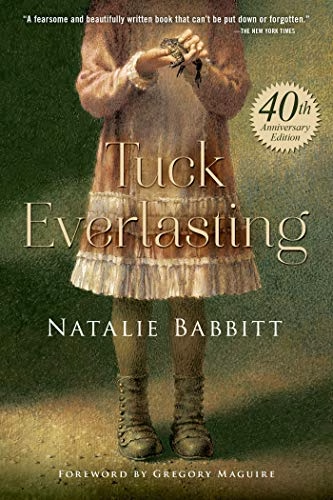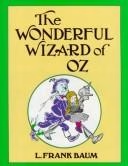Plot Summary
The Meeting in the Wood
In the first week of August, in the sleepy village of Treegap, ten-year-old Winifred “Winnie” Foster feels stifled by her overprotective family and the rigid order of her “touch-me-not cottage.” Longing for freedom and adventure, she contemplates running away. Her family owns the adjacent wood, a place she has never entered but which now beckons. That same evening, a mysterious stranger in a yellow suit appears at her gate, asking questions about a family he is looking for. His conversation with Winnie and her grandmother is interrupted by a faint, tinkling melody coming from the wood, which Winnie’s grandmother dismisses as “elf music.” Intrigued, Winnie resolves to venture into the wood the next morning.
The following day, Winnie slips out at dawn and enters the beautiful, sun-dappled forest. She soon discovers a clearing with a giant ash tree, and at its base, a handsome boy, Jesse Tuck, drinking from a small spring bubbling out of the ground. Winnie is instantly captivated by him. When a thirsty Winnie tries to drink from the spring herself, Jesse frantically stops her, insisting the water is not safe. His alarm is interrupted by the arrival of his mother, Mae, and his older brother, Miles. Seeing Winnie with Jesse by the spring, Mae realizes their long-held secret is in danger. In a panic, they seize a stunned Winnie, place her on their horse, and flee, beginning an accidental kidnapping.
The Kidnapping and the Secret
As they ride away, the Tucks are not menacing, but rather frightened and apologetic, pleading with a speechless Winnie not to be scared. They promise to explain everything and return her home the next day. During their escape, they pass the man in the yellow suit, who witnesses the event. Once they are a safe distance away, they stop by a stream to calm down and explain their extraordinary secret.
Eighty-seven years prior, the Tuck family—Mae, her husband Angus (Tuck), and their sons Miles and Jesse—had been traveling through the forest and drank from the spring. Unbeknownst to them, the spring’s water granted them immortality. They only realized something was wrong over the next two decades as they, and their horse, failed to age. Jesse fell from a tree without injury, Angus survived a shotgun blast to the heart, and their friends and neighbors grew old while they remained unchanged. Suspected of witchcraft, they were forced to leave their home. Miles’s wife left him, taking their two children, believing he had sold his soul to the devil. They eventually realized the spring was the source of their condition. Mae explains to Winnie that if she had drunk the water, she would have remained a ten-year-old girl forever.
A New Perspective
Winnie is initially disbelieving but is also drawn to the gentle, childlike nature of the Tucks. She agrees to go with them to their secluded home, feeling a sense of importance and adventure she has never known. The Tucks’ home is a chaotic, messy, but warm and welcoming place, a stark contrast to her own sterile cottage. She learns that the family reunites every ten years, and this is one such occasion.
That evening, Winnie’s initial excitement fades into homesickness and fear. She declares she wants to go home, unsettling the Tucks. Angus Tuck insists on taking her for a row on their pond to explain the gravity of their situation. In the rowboat, surrounded by the quiet hum of nature, Tuck uses the water’s flow and the life cycle of the pond’s creatures to form a powerful metaphor. He describes life as a great “wheel,” constantly turning, with birth, growth, and death as essential parts of the cycle. The Tucks, he explains, are no longer part of this wheel. They are “stuck,” like rocks beside the road, unable to change or die. He passionately argues that death is not a tragedy but a necessary and beautiful part of being alive. He fears what would happen if the world discovered the spring, with people clamoring for eternal life, only to find themselves trapped in a stagnant, meaningless existence. His profound sadness and wisdom deeply affect Winnie, who begins to understand the burden of immortality. Their conversation is cut short when they learn their horse has been stolen—taken by the man in the yellow suit.
Confrontation and Consequences
The man in the yellow suit, having overheard the Tucks’ story by the stream, rides their horse back to the Fosters’ cottage. He reveals he knows where Winnie is and leverages this information to blackmail the family into selling him the wood. His plan is to bottle and sell the spring water to a select, wealthy clientele. With the deed to the wood in his pocket, he leads the local constable toward the Tucks’ home.
The next morning, the man arrives at the Tuck house alone, having ridden ahead of the slow-moving constable. He reveals that his grandmother knew Miles’s wife, and he has spent his life searching for the immortal family. He condescendingly offers the Tucks a role in his commercial venture, suggesting they perform feats to “demonstrate” the water’s power. When they refuse, he callously declares he will use Winnie for his demonstrations instead. Enraged at the threat to Winnie and the secret, Mae Tuck strikes him on the head with the stock of a shotgun just as the constable arrives. The man collapses, mortally wounded. Mae is immediately arrested for assault. The constable informs the horrified Tucks that if the man dies, Mae will be tried for murder and sent to the gallows. This presents a terrible paradox: if hanged, Mae’s immortality would be revealed to the world.
The Escape Plan
Winnie is returned home, where her family is relieved but unable to comprehend her experience or her affection for the Tucks. That night, the constable informs them that the man in the yellow suit has died. Mae Tuck will now face the gallows. Winnie knows she must act.
The next day, Jesse secretly visits Winnie at her fence. He explains Miles’s plan to remove the bars from the jailhouse window that night to free Mae. However, the constable is watching the cell closely, so they will have little time to escape. In a flash of inspiration, Winnie devises a plan: she will take Mae’s place in the cell. In the dark, covered by a blanket, the constable won’t notice the switch until morning, giving the Tucks a crucial head start. Jesse gives Winnie a bottle of the spring water, urging her to drink it when she turns seventeen so she can join him forever.
At midnight, during a fierce thunderstorm, Winnie sneaks out to meet the Tucks at the jailhouse. Miles expertly pries the window frame loose. Mae squeezes through, and after a tearful, hurried goodbye, Winnie climbs into the cell. Miles replaces the window, and the Tucks disappear into the night, their escape masked by the storm. Winnie spends the night in the cell, successfully deceiving the constable until morning.
Epilogue: The Wheel Turns
Decades later, in 1950, Mae and Angus Tuck return to Treegap. The village is transformed, with paved roads and modern buildings. The magical wood has been bulldozed, destroyed by a lightning strike years before. In the town cemetery, they find Winnie’s gravestone. The inscription reveals that she had lived a full, natural life as a wife and mother, dying in 1948. She had chosen mortality. Angus, though saddened, calls her a “good girl” for embracing the wheel of life. As they leave town, Tuck moves a toad out of the road, remarking that it must think it’s going to live forever—unaware that it is the same toad Winnie had saved and sprinkled with the spring water, granting it the immortality she had refused for herself.
Characters
Winnie Foster
Winnie begins the story as a proper, sheltered, and lonely ten-year-old, frustrated by the oppressive rules of her prim family. Her impulsive decision to enter her family’s wood is her first true act of rebellion, setting her on a transformative journey. Her encounter with the Tucks shatters her naive worldview. Initially a frightened victim of a kidnapping, she quickly becomes an essential confidante and friend. Winnie possesses a deep well of empathy and a strong moral compass. She is able to look past the Tucks’ strange circumstances and see their inherent goodness. Her decision to help Mae escape is the climax of her development, transforming her from a passive, protected child into a brave, decisive individual who takes a profound risk for those she loves. Ultimately, her choice not to drink the spring water signifies her mature understanding of Angus Tuck’s wisdom about the beauty and necessity of the natural cycle of life and death.
Mae Tuck
Mae is the warm, maternal heart of the Tuck family. She is a simple, practical woman whose love for her husband and sons is the anchor of her unending life. She carries a small music box, a symbol of the past and a source of comfort, but also the very thing that inadvertently leads the man in the yellow suit to them. Mae is less philosophical than her husband; her primary concern is protecting her family and their secret. While gentle by nature, she possesses a fierce, protective instinct. Her violent attack on the man in the yellow suit is not born of malice, but of a desperate need to protect Winnie and prevent the secret of the spring from being exploited. She represents the quiet endurance and emotional strength required to cope with an immortal existence.
Angus Tuck (Tuck)
Angus Tuck is the patriarch of the family and the story’s primary philosophical voice. He is weary, sad, and deeply troubled by the reality of his immortality. More than anyone else, he sees their condition not as a gift, but as a profound curse that has removed them from the natural order of the world. His metaphor of the “wheel of life” is the central theme of the book. He longs to grow, change, and eventually die, viewing death as a crucial part of being alive. He feels their existence is pointless, “like rocks beside the road.” His quiet wisdom and gentle, melancholy nature have a powerful impact on Winnie, shaping her final decision more than anyone else’s influence.
Jesse Tuck
At one hundred and four years old, yet forever seventeen, Jesse embodies the youthful, carefree perspective on immortality. He sees their eternal life as a grand, unending adventure, a chance to “see everything.” He is charming, energetic, and lives entirely in the moment, having never had to face the long-term consequences of adulthood or loss in the same way as his brother, Miles. He represents the seductive appeal of eternal youth. His proposal to Winnie—that she drink the water at seventeen and join him—is the central temptation she must face. While his view is naive, it is born of loneliness and a genuine affection for Winnie.
Miles Tuck
Miles, who appears to be in his early twenties, carries the practical burdens and sorrows of immortality. He has experienced profound loss: his mortal wife left him, and his children grew old and died while he remained young. This experience has made him more somber, responsible, and cautious than Jesse. He understands the painful complexities of being frozen in time while the world moves on. A skilled blacksmith and carpenter, he is practical and resourceful, devising the plan to free his mother from jail. He represents the tangible, human cost of eternal life.
The Man in the Yellow Suit
The unnamed antagonist is a figure of cold, calculating greed. Driven by a lifelong obsession with the story of an immortal family told to him by his grandmother, he is single-minded in his pursuit. He is polite and smooth on the surface, but his sophisticated demeanor masks a ruthless and amoral nature. He feels entitled to the spring, believing that ignorant people like the Tucks do not deserve it and that he alone is worthy of controlling it. He has no regard for the sanctity of life or the consequences of his actions, viewing the spring only as a source of immense wealth and power.
Core Themes
The Natural Cycle of Life and Death
This is the novel’s central and most profound theme. Angus Tuck’s “wheel of life” metaphor frames the entire narrative. He argues that life is a dynamic process of birth, growth, change, and eventual death, and that every living thing is a part of this beautiful, interconnected cycle. To be removed from it, as the Tucks are, is to be denied the very essence of living. The book presents death not as something to be feared, but as a natural and necessary conclusion that gives life meaning and purpose. Winnie’s ultimate choice to live a mortal life is an affirmation of this theme, embracing the wheel rather than stepping off it.
Immortality: Blessing or Curse?
Tuck Everlasting explores the concept of immortality from multiple perspectives, ultimately framing it as a heavy burden.
* Jesse sees it as a blessing—an opportunity for endless fun and adventure without consequence.
* Miles views it as a source of loss and loneliness, having watched his own family grow old and leave him behind.
* Angus sees it as the ultimate curse—a stagnant, unnatural state of “being” rather than “living.”
* The Man in the Yellow Suit sees it as the ultimate commodity—a source of power and profit to be controlled and sold.
The novel concludes that an unchanging life becomes meaningless. Growth and change are essential to a fulfilling existence, making mortality a precious gift.
Freedom vs. Confinement
Winnie’s story begins with her feeling trapped inside the fence of her family’s yard, a symbol of her sheltered and restrictive life. Her “kidnapping” paradoxically becomes her first taste of true freedom, allowing her to experience the world, make her own friends, and form her own judgments. Later, Mae is literally confined in the jailhouse, facing the ultimate confinement of the gallows. Winnie’s brave act to free Mae is also an act of freeing herself from the expectations of her family and asserting her own independent identity. The toad, frequently seen by the road, also symbolizes a simple, natural freedom that Winnie envies.
Plot devices
The Wheel Metaphor
This is the most significant literary device in the book, used by Angus Tuck to explain the natural order of the universe. The wheel represents the cyclical nature of life, death, and rebirth. It is always in motion, always changing. Tuck explains that the Tucks have “dropped off” the wheel, becoming static observers rather than active participants. This powerful and easily understood image encapsulates the book’s core philosophy and provides Winnie with the framework she needs to make her life-altering decision.
The Magic Spring
The spring is the central plot device, the catalyst for the entire story. It is a classic magical element that raises profound questions about life, death, and morality. Its location in a pristine, secluded wood suggests a force of nature that was never meant for human interference. The spring functions as both a source of temptation (represented by Jesse’s offer) and a source of danger (represented by the man in the yellow suit’s greed). It forces every character who learns of it to confront their deepest beliefs about what it means to be alive.
Mae’s Music Box
Mae’s simple, painted music box is a recurring symbol of the Tucks’ unchanging past. Its gentle, tinkling melody represents comfort, nostalgia, and the family’s simple goodness. However, it is also a double-edged symbol. It is the familiar tune that provides the man in the yellow suit with the final clue in his lifelong search, leading him directly to the Tucks and setting the story’s tragic climax in motion. The music box thus represents the inescapable nature of their secret and the impossibility of hiding from the world forever.
The Toad
The toad is a subtle but vital symbol throughout the narrative. It is Winnie’s first confidant, the silent audience to her frustrations about her confined life. The toad represents the steady, unglamorous, and persistent nature of life. It reappears at crucial moments, acting as a quiet witness to Winnie’s journey. In the final chapter, Winnie’s act of pouring the immortal water on the toad is deeply symbolic. Unable to choose immortality for herself but unwilling to discard the gift entirely, she bestows it upon a simple creature, protecting it from a dog and granting it safety “forever.” The toad becomes the unwitting inheritor of the immortality Winnie rejects.





